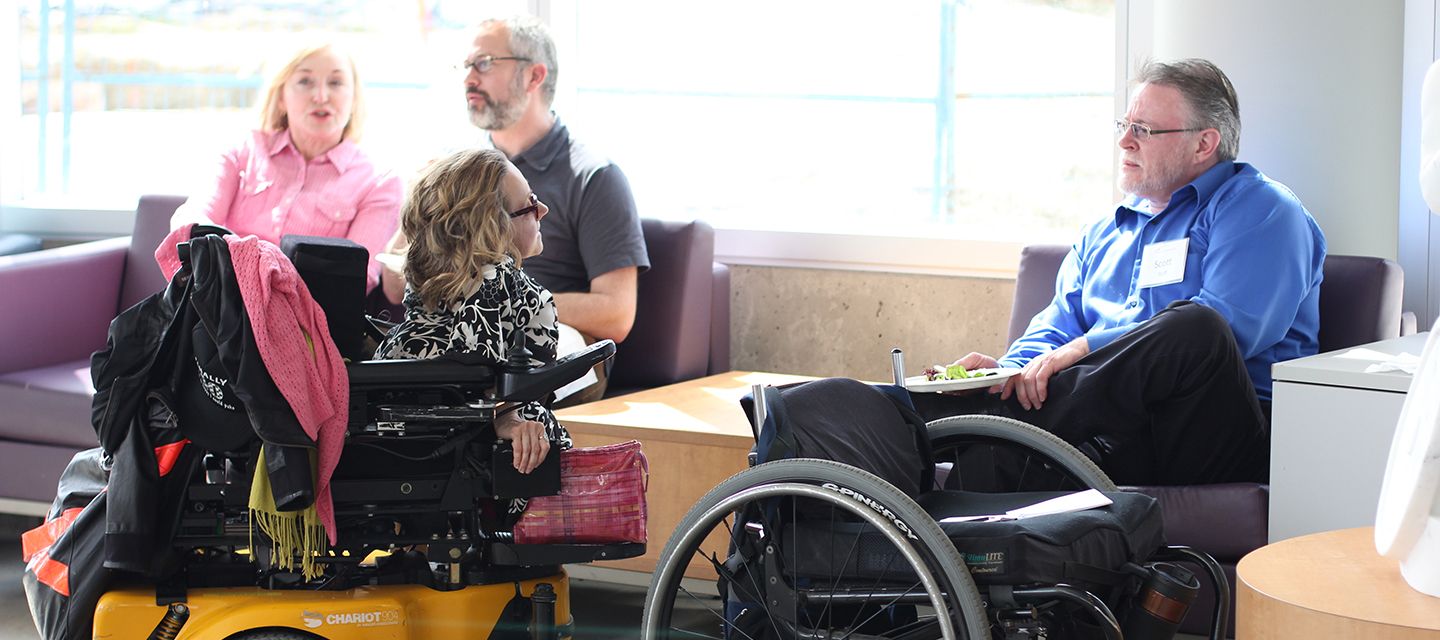Like many modern relationships, Heather and Chris met online. In their case it is a research relationship built on a shared desire to improve the lives of people living with spinal cord injury.
Dr. Heather Gainforth is an Assistant Professor in the School of Health and Exercise Sciences in UBC Okanagan’s Faculty of Health and Social Development. Her research is focused on finding the best ways to move health research evidence into the hands of research users in order to change behavior and improve health outcomes. With a wide-ranging health research background, Heather had specific experience of working in the area of spinal cord injury. While she acknowledges how much she learned from fellow researchers specializing in knowledge translation in this area, she is particularly grateful to the communities she worked with who taught her that when it comes to spinal cord injury research, ‘there’s nothing about us without us.’

It was this understanding of the essential role involved communities must play in spinal cord research that ‘hooked’ Chris McBride, Executive Director of Spinal Cord Injury BC, when Heather first reached out to him over Twitter. Their exchange of tweets led to a phone call where Heather asked an all-important question that set her apart from the countless researchers who request to work with Spinal Cord Injury BC. She asked “how can I help?”
BC is fortunate to have a large concentration of spinal cord injury researchers, but because of this, the demand for research participants generally outstrips the number of patients. As such, Chris and his team are very particular about who they work with, never opting to just act as recruiters for participants, but instead embarking on research partnerships where they are embedded throughout the process and asking the questions they believe will yield the most benefits for the community they serve.
Having established their mutual understanding of the vital role the spinal cord injury community must have in any type of research, Heather and Chris started discussing their interest in exploring peer mentorship. Peer mentorship is a form of mentorship that usually takes place between a person who has lived through a specific experience and a person who is new to that experience.

Taking part in the SSHRC funded Spinal Cord Injury Peer Mentorship study, Heather and Chris were part of a pan-Canadian community-university partnership that aimed to co-create a spinal cord injury peer mentorship evaluation tool. Having already matched themselves, they now sought to match people across the country with similar lived experiences of spinal cord injury who could help each other adapt and / or thrive.
The paired up peers would have phone conversations, which Heather, Chris and a team of graduate students would record and evaluate to try to understand what made for successful peer mentorship for people with spinal cord injury. This initial research has led to several different projects, many of which have received funding, exploring other applications of peer mentorship in the area of spinal cord injury such as amongst family and caregivers or to help with smoking cessation. Not only that, it has also helped to train the next generation of knowledge translation experts through the involvement of graduate students from Heather’s Applied Behaviour Change Lab.
Heather asked an all-important question that set her apart from the countless researchers who request to work with Spinal Cord Injury BC. She asked “how can I help?”
Reflecting on their partnership Heather and Chris appreciate how much they’ve learned from one another, with the role of mentor and mentee continually switching – mirroring the experiences they witnessed among their peer mentorship participants. They also acknowledge how much they continue to learn from the spinal cord injury community and the invaluable observations members of that community have shared with them about how spinal cord injury research is conducted and what changes need to be made.
These observations have clear implications not just for those working in spinal cord injury, but for researchers exploring knowledge exchange in any discipline. Heather reflects on theses implications: “How do we foster partnership across all disciplines? How do we take what we’re doing and make that easier for researchers, for research users and for funders to be able to support this across the board? I keep thinking of that quote a rising tide lifts all boats, and I think that’s what we’re trying to do, thinking about rising the tide on research and thinking about how do we actually make sure that we’re developing the best and most meaningful partnerships we can. ”
Find out more about Dr. Heather Gainforth and Chris McBride’s experience of knowledge exchange in this conversation facilitated by Dr. Minelle Mahtani, Associate Professor at the Institute for Social Justice at UBC from the event Candid Conversations - The Importance of Dialogue in Generating Impact held by the UBC Knowledge Exchange Unit on May 15, 2019
Find out more about the UBC Knowledge Exchange Unit
